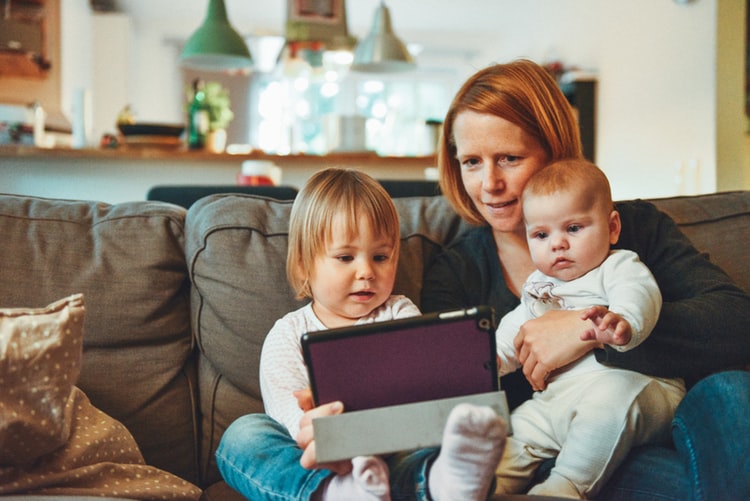
*collaborative post*
Online safety has been on my mind a lot lately. Leo (and Alex, actually) is getting more and more interested in mine and Oli’s smartphones. He has progressed from just wanting to play games, he now likes to watch videos on YouTube as well. I don’t mind him being on YouTube when we are with him but I do not like him going and watching it alone in his bedroom as it is all too easy for him to stumble across something he is too young to see. With smartphones being literally EVERYWHERE it feels impossible to keep our children out of the online world for as long as we would like. Luckily for anxious parents like me, there are lots of tools and resources available out there purposefully created to help keep our children safe when using the internet. Today’s guest post is full of tips and online safety advice, I hope you find it useful.
Tips and advice on how to keep your children safe online.
There has long been a lot of debate surrounding children and technology. A lot of parents have different ideas of when a child should be allowed to access a computer, smartphone, and the other technology which drives our lives, and it doesn’t seem like there’s a correct answer to this problem.
A lot of parents will want their children to grow up with as little influence from technology as possible, while some will want their kids to access these tools from a very young age. Whichever side of this fence you sit on, everyone can agree that keeping the little ones safe is a major priority. To help you out with this, this post will be exploring safety in the digital world, and the work a parent can do to protect their children.
Access To Devices
Being able to access devices like smartphones and computers open the doors to a lot of risk for a child. There are bad people online, and plenty of content which parents won’t want their children to look at, making it worth thinking about your child’s access to devices when they are at home and out and about.
The computer everyone uses in your home will be a safe place for a young child to learn about technology. They don’t necessarily have to be connected to the internet to use a machine like this properly, and you will have the chance to keep a watchful eye over them. Smartphones will be harder to keep tabs on, as it won’t be as easy to stop them from connecting to the web with a device like this, and you may struggle to keep an eye on what they’re doing.
Giving a child access to their own phone is a difficult decision. There are a lot of resources around the web which tell you how to choose a phone for your child, and these can be incredibly useful when you’re making this choice. If you don’t feel comfortable with your child accessing the internet on their own, but want them to have a phone to talk to you, you could consider getting a regular mobile device, rather than a smartphone for them.
Parental Controls
Of course, choosing which devices your child has access to isn’t the only part of this. You also need to think about how you can regulate the content they’re able to view on their phone, computer, and other devices, and this is where parental controls come in.
You can find apps for both Android and iOS which give parents the chance to control their child’s smartphones. This can enable you to choose which websites they can visit, the time they can spend on their phone, and the apps they are allowed to download, while also being able to lock their device if you are worried they’re doing something they shouldn’t be. This may seem a little oppressive, but it will protect your little one if they have a device like this.
It’s harder to control what they can access on a normal computer. Parental control software can be downloaded for both Windows and MacOS, but you will need to do some research to find an option which has the features you want. At the very least, it will be crucial that you can block certain websites from them.
It can be hard to understand the rules which are found online, but it’s well worth respecting them for the sake of your child. For example, people under the age of 13 aren’t supposed to engage in online interactions. This means that they shouldn’t have accounts which let them post comments, send messages, or communicate with strangers on the web in any fashion. Rules like this exist for a reason, with people below this age group often being targeted by a range of different criminals.

Monitoring
Giving your child some freedom online is always good, and this can help them to better learn how to use these tools. It’s worth having some monitoring in place, though, and there are a lot of tools which can be used for this job. Smartphones with parental tools installed will be easy to monitor; you will usually be able to see the same screen as your child.
When it comes to the computer you use, you may have to be a little sneakier, as it can be quite easy to hide internet history. Most modern routers will enable you to monitor the internet history for your whole network, enabling you to see exactly what your child has seen, even if they delete the history from their machine.
There are softer forms of monitoring out there, and a lot of parents find success when they put their trust in their children. By simply asking them what they’ve visited or done on their devices each day, you can build a balance which will make them aware that you care deeply about this side of their life.
A lot of parents are very careful when it comes to monitoring. A child is likely to stumble into places they shouldn’t from time to time, but getting angry about this will make it harder for them to be open if they ever have a bigger problem with their life online. This makes it crucial that you react in a measured way, while also being open about your concerns. Telling a child that they can’t access a website because you say it’s not right will drive them to try and see it, but explaining exactly why they shouldn’t go will take away this mystery.
Keeping a child safe in the digital world has never been easier. Companies have been working tirelessly to improve the security of their youngest users, and a lot of tools are being created which put the power into parents’ hands. Of course, though, you still have to work to make sure that you little ones aren’t seeing anything which isn’t right for them, and this can take a little bit of learning to get right.
***
Do you have any security measure in place to keep your children safe online? I would love for you to share your tips and advice for online safety in the comments.
Disclaimer: This is a collaborative post.

What a great post. Please keep sharing articles like this. I’m sure a lot of parents out there will find these tips useful for keeping kids safe online.